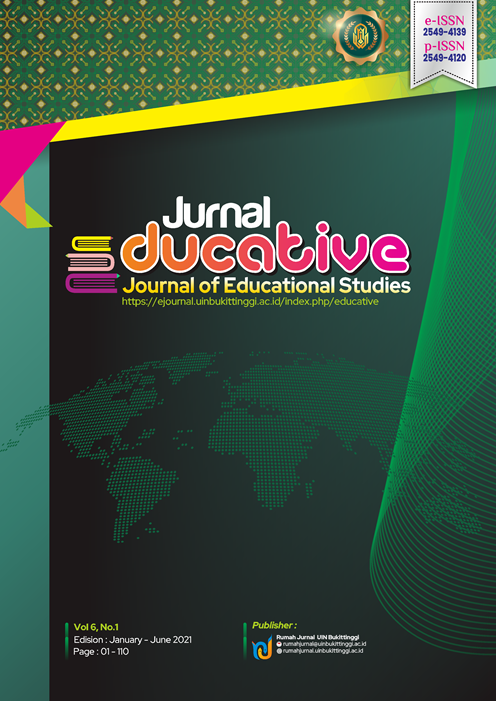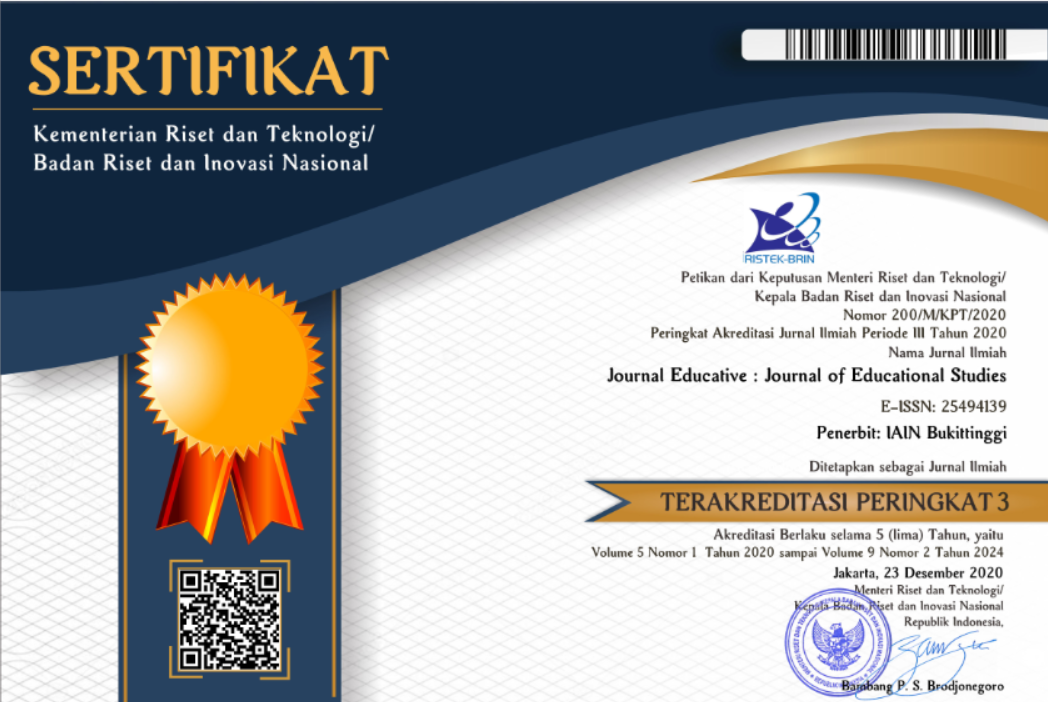Perceptions of the English Language Intensive Course for Overseas Students’ Program Toward Vocabulary Learning Strategies
DOI:
https://doi.org/10.30983/educative.v9i1.8553Keywords:
perception, vocabulary learning strategies, ELICOSAbstract
The objective of this research is to investigate the benefits received by international students at the English Language Intensive Course for Overseas Students' program (ELICOS) of the University of Canberra College English Language Centre (UCCELC) in Australia in implementing Vocabulary Learning Strategies (VLS). The benefits are in terms of finding new vocabulary outside of the classroom, writing the words directly while encountering new words, making a connection for the meaning of the words, studying the aspects of the new words, rehearsing, saying the new words aloud and jotting the word down, getting an image of the first time they met the words, and using new vocabulary in daily conversation. A qualitative design was used to collect information from six international students from various nations, including Indonesia, China, the Philippines, and Japan, utilising interviews. The interview data were analysed and presented using qualitative research processes such as coding, grouping, argument creation, and drafting. The findings of this study demonstrated that students in the ELICOS program use a variety of vocabulary learning strategies, including cognitive, metacognitive, memory, and social strategies. Furthermore, all students reported that they gained a considerable beneficial impact on their language learning proficiency by applying behaviors of some particular vocabulary learning strategies These findings have significant implications for increasing the quality of language teaching and learning processes, as well as enriching the research repertory in the field of VLS.
Bahasa Inggris untuk Mahasiswa Luar Negeri (ELICOS) dari University of Canberra College English Language Centre (UCCELC) di Australia dalam mengimplementasikan Strategi Pembelajaran Kosakata (Vocabulary Learning Strategies - VLS). Manfaatnya adalah menemukan kosakata baru di luar kelas, menulis kata-kata tersebut secara langsung ketika bertemu dengan kata-kata baru, membuat hubungan makna kata-kata tersebut, mempelajari aspek-aspek dari kata-kata baru tersebut, berlatih, mengucapkan kata-kata baru tersebut dengan lantang dan menuliskan kata tersebut, mendapatkan gambaran ketika pertama kali bertemu dengan kata-kata tersebut, dan menggunakan kosakata baru tersebut dalam percakapan sehari-hari. Untuk mengumpulkan informasi dari enam mahasiswa internasional dari berbagai negara, termasuk Indonesia, Cina, Filipina, dan Jepang, dengan menggunakan wawancara. Data wawancara dianalisis dan disajikan dengan menggunakan proses penelitian kualitatif seperti pengkodean, pengelompokan, pembuatan argumen, dan penyusunan. Temuan dari penelitian ini menunjukkan bahwa siswa dalam program ELICOS menggunakan berbagai strategi pembelajaran kosakata, termasuk strategi kognitif, metakognitif, memori, dan sosial. Selain itu, semua siswa mengakui bahwa mereka mendapatkan dampak yang cukup menguntungkan pada kemampuan belajar bahasa mereka dengan menerapkan aspek-aspek VLS. Temuan ini memiliki implikasi yang signifikan untuk meningkatkan kualitas proses belajar mengajar bahasa, serta memperkaya khazanah penelitian di bidang VLS.
References
Books
Griffiths, Carol, The Strategy Factor in Successful Language Learning (Multilingual Matters, 2013), LXVII
Ma, Qing, Second Language Vocabulary Acquisition (Peter Lang, 2009), LXXIX
Cenoz, Jasone, Towards Multilingual Education: Basque Educational Research from an International Perspective (Multilingual Matters, 2009), LXXII
Nation, Ian S P, Learning Vocabulary in Another Language Google EBook (Cambridge University Press, 2013)
Oxford, Rebecca, Language Learning StrategiesWhat Every Teacher Should Know (Heinle & heinle Publishers.;, 1990)
Patton, Michael Quinn, Qualitative Research & Evaluation Methods: Integrating Theory and Practice (Sage publications, 2014)
Read, John, ‘Focus on Vocabulary [Book Review]’, New Zealand Studies in Applied Linguistics, 13.1 (2007), 101
Cohen, Andrew D, Strategies in Learning and Using a Second Language (Routledge, 2014)
Richards, Jack C, and Willy A Renandya, Methodology in Language Teaching: An Anthology of Current Practice (Cambridge university press, 2002)
Schmitt, Norbert, and Diane Schmitt, Vocabulary in Language Teaching (Cambridge university press, 2020)
Journal
Asgari, Azadeh, and Ghazali Bin Mustapha, ‘The Type of Vocabulary Learning Strategies Used by ESL Students in University Putra Malaysia’, English Language Teaching, 4.2 (2011), 84
Atay, Derin, and Cengiz Ozbulgan, ‘Memory Strategy Instructioyn, Contextual Learning and ESP Vocabulary Recall’, English for Specific Purposes, 26.1 (2007), 39–51
Beaton, Alan, Michael Gruneberg, and Nick Ellis, ‘Retention of Foreign Vocabulary Learned Using the Keyword Method: A Ten-Year Follow-Up’, Second Language Research, 11.2 (1995), 112–20
Berne, Jennifer I, and Camille L Z Blachowicz, ‘What Reading Teachers Say about Vocabulary Instruction: Voices from the Classroom’, The Reading Teacher, 62.4 (2008), 314–23
Burns, Anne, and Jack C Richards, The Cambridge Guide to Learning English as a Second Language (Cambridge University Press, 2018)
Campbell, Steve, Melanie Greenwood, Sarah Prior, Toniele Shearer, Kerrie Walkem, Sarah Young, and others, ‘Purposive Sampling: Complex or Simple? Research Case Examples’, Journal of Research in Nursing, 25.8 (2020), 652–61
Cohen, Andrew D, and Carol Griffiths, ‘Revisiting LLS Research 40 Years Later’, Tesol Quarterly, 49.2 (2015), 414–29
Dóczi, Brigitta, ‘Comparing the Vocabulary Learning Strategies of High School and University Students: A Pilot Study’, WoPaLP, 5 (2011), 138–58
Ehrman, Madeline E, and Rebecca L Oxford, ‘Cognition plus: Correlates of Language Learning Success’, The Modern Language Journal, 79.1 (1995), 67–89
Fatima, Irum, and Zahid Hussain Pathan, ‘Investigating Learning Strategies for Vocabulary Development: A Comparative Study of Two Universities of Quetta, Pakistan’, Advances in Language and Literary Studies, 7.2 (2016), 7–12
Fitriani, Suci, and Febria Sri Artika, ‘International Students’ Vocabulary Learning Strategies at the English Language Intensive Course for Overseas Students’ Program’, Jurnal Educative: Journal of Educational Studies, 5.2 (2020), 136–48
Gerami, Mohammad Hossein, and Shiva Madani Ghareh Baighlou, ‘Language Learning Strategies Used by Successful and Unsuccessful Iranian EFL Students’, Procedia-Social and Behavioral Sciences, 29 (2011), 1567–76
Green, John M, and Rebecca Oxford, ‘A Closer Look at Learning Strategies, L2 Proficiency, and Gender’, TESOL Quarterly, 29.2 (1995), 261–97
Gu, Yongqi, and Robert Keith Johnson, ‘Vocabulary Learning Strategies and Language Learning Outcomes’, Language Learning, 46.4 (1996), 643–79
Hong-Nam, Kyungsim, and Alexandra G Leavell, ‘Language Learning Strategy Use of ESL Students in an Intensive English Learning Context’, System, 34.3 (2006), 399–415
Jenkins, Jennifer, ‘Current Perspectives on Teaching World Englishes and English as a Lingua Franca’, TESOL Quarterly, 40.1 (2006), 157–81
Kaya, Jean, and Krassimira Charkova, ‘The Most and Least Frequent Vocabulary Learning Strategies of High School English Language Learners’, International Journal of English Language Education, 2.2 (2014), 122–41
Lightbown, Patsy M, and Nina Spada, How Languages Are Learned 4th Edition-Oxford Handbooks for Language Teachers (Oxford university press, 2013)
Manuel, N N, ‘Evaluating Vocabulary Learning Strategies (VLS): Gender Differences, the Most and Least Used (VLS) among Angolan EFL Students at the Faculty of Arts (Luanda, Angola)’, International Journal of Scientific Research in Education, 10.5 (2017), 483–504
Nation, I S P, ‘Teaching ESL/Teaching ESL/EFL Reading and W SL/EFL Reading and Writing Reading and Writing’, 2009
Safian, Nur Hanisah, Sharmila Malakar, and Seyed Ali Rezvani Kalajahi, ‘Exploring Vocabulary Learning Strategies Used by UPM TESL Undergraduates’, Advances in Language and Literary Studies, 5.5 (2014), 1–4
Schmitt, Norbert, ‘Current Perspectives on Vocabulary Teaching and Learning’, International Handbook of English Language Teaching, 2007, 827–41
Schmitt, Norbert, and Paul Meara, ‘Researching Vocabulary through a Word Knowledge Framework: Word Associations and Verbal Suffixes’, Studies in Second Language Acquisition, 19.1 (1997), 17–36
Takac, Visnja Pavicic, ‘From Individual Differences to Common Patterns in the Use of Vocabulary Learning Strategies’, The European Journal of Applied Linguistics and TEFL, 1.1 (2012), 81–97
Wu, Manfred Man-fat, ‘Language Learning Strategy Use of Chinese ESL Learners of Hong Kong-Findings from a Qualitative Study’, Electronic Journal of Foreign Language Teaching, 5.1 (2008), 68–83
Downloads
Published
How to Cite
Issue
Section
Citation Check
License
Copyright (c) 2024 Febria Sri Artika, Suci Fitriani

This work is licensed under a Creative Commons Attribution-ShareAlike 4.0 International License.
Authors who publish with this journal agree to the following terms:
1. Authors retain copyright and grant the journal right of first publication with the work simultaneously licensed under a Creative Commons Attribution License that allows others to share the work with an acknowledgment of the work's authorship and initial publication in this journal.
2. Authors are able to enter into separate, additional contractual arrangements for the non-exclusive distribution of the journal's published version of the work (e.g., post it to an institutional repository or publish it in a book), with an acknowledgment of its initial publication in this journal.
3. Authors are permitted and encouraged to post their work online (e.g., in institutional repositories or on their website) prior to and during the submission process, as it can lead to productive exchanges, as well as earlier and greater citation of published work (See The Effect of Open Access).




